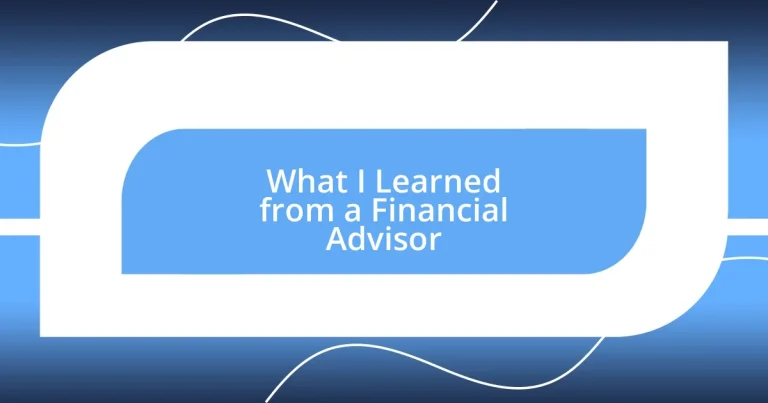Key takeaways:
- Financial advisors provide personalized guidance, aligning financial strategies with individual values and goals, enhancing decision-making and accountability.
- Implementing the SMART framework for goal setting fosters clarity and motivation by breaking down aspirations into specific, measurable milestones.
- Diversification, long-term thinking, and strategic debt management are crucial investing and financial planning strategies that significantly improve financial health and growth potential.
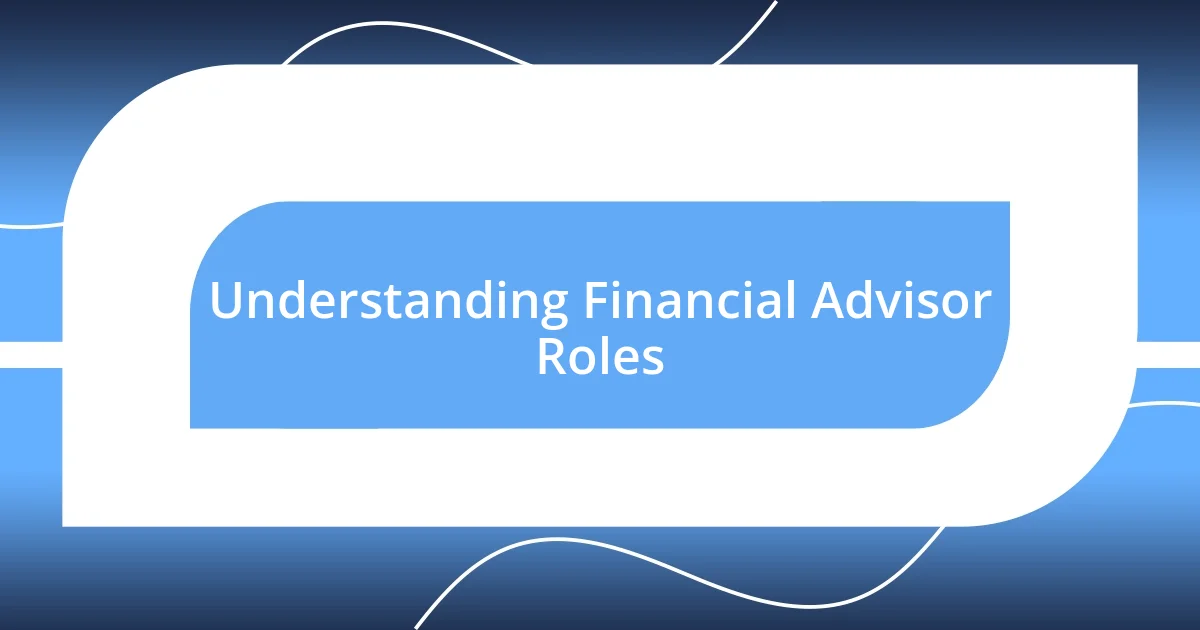
Understanding Financial Advisor Roles
When I first approached my financial advisor, I was surprised by the range of roles they actually take on. They’re not just investment experts; they wear many hats, acting as planners, strategists, and even educators in the financial realm. For instance, I remember sitting in their office and discussing my future goals, which expanded my understanding of how comprehensive financial planning truly is.
One of the most striking aspects of a financial advisor’s role is the personalized approach they bring to your financial situation. It’s not a one-size-fits-all scheme. I once shared my worries about retirement savings, and my advisor helped craft a tailored strategy. It made me realize how crucial it is to have someone who listens and aligns your financial plan with your personal values and aspirations.
Additionally, financial advisors serve as a bridge between you and the complex world of investments. I found it eye-opening when my advisor explained the significance of risk tolerance and asset allocation in simple terms. It’s easy to feel overwhelmed, but having someone break down those concepts truly lights up the path to informed decision-making, don’t you think?
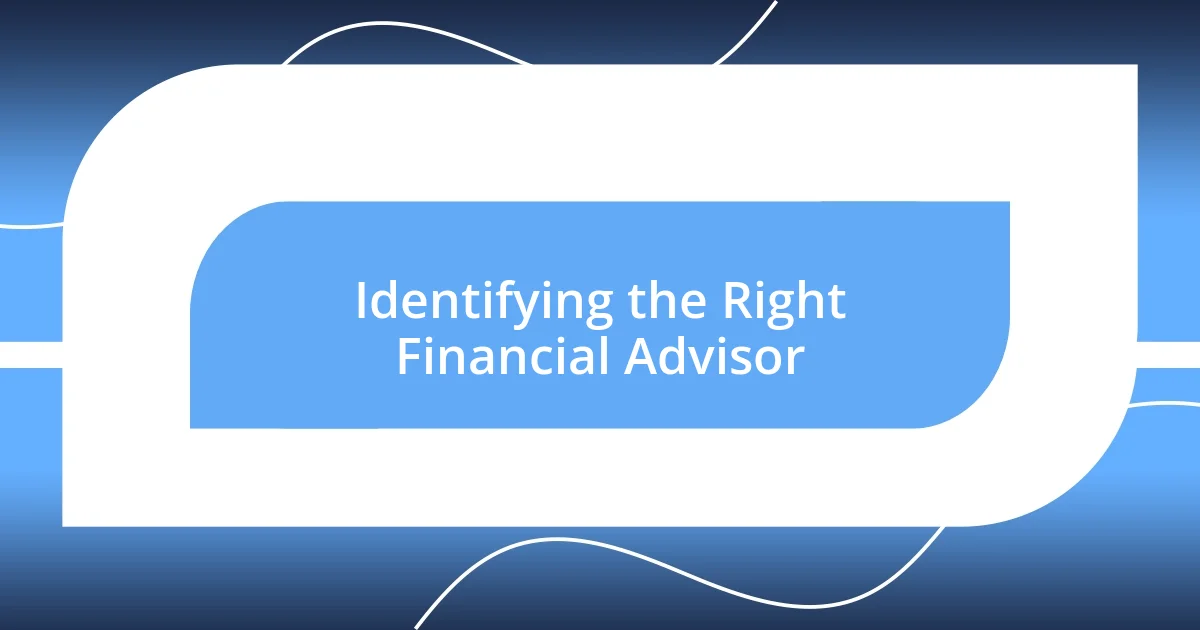
Identifying the Right Financial Advisor
Finding the right financial advisor can feel overwhelming, but it’s essential to filter through options to identify someone suited to your needs. I learned firsthand that a strong rapport is vital; I recall my first meeting where my advisor not only evaluated my financial status but also took the time to understand my personal worries about market fluctuations and future uncertainties. That connection gave me confidence; I knew I was in capable hands.
To help you identify the right advisor for your financial journey, consider the following factors:
- Credentials and Experience: Look for advisors with certifications like CFP (Certified Financial Planner) or CFA (Chartered Financial Analyst) to ensure they possess the necessary expertise.
- Specialization: Understand their areas of focus—whether it’s retirement planning, tax strategies, or investment management—and find someone who aligns with your goals.
- Communication Style: Pay attention to how they communicate. I appreciate advisors who simplify complex concepts, making them easier to grasp while keeping me engaged.
- Fees and Compensation: Know how they charge for services—whether it’s a flat fee, hourly rate, or commission—so you can budget accordingly and avoid surprises.
- Client Reviews and Referrals: Don’t hesitate to ask for references or read reviews from their current clients; this gave me a clearer picture of their reputation and effectiveness.
Ultimately, aligning your values and comfort levels with your advisor’s approach will pave the way for a productive partnership.

Setting Financial Goals with Advisors
Setting financial goals with an advisor is a transformative experience that often sheds light on what truly matters in our financial lives. I remember sitting down with mine and feeling a wave of clarity wash over me as we outlined my short-term and long-term aspirations. It’s not just about numbers on a spreadsheet; it’s about what those figures represent for my life—like a dream vacation or financial security for my family. This personalization made me realize that my goals were not only achievable but deeply connected to my values.
As we delved deeper, my advisor introduced me to the concept of SMART goals—specific, measurable, achievable, relevant, and time-bound. This framework was a game-changer for me! I used to think vague desires were enough, but I learned that specificity illuminates the path to success. It was eye-opening to see how detailing each goal transformed my perspective and gave me confidence in my financial roadmap. In fact, we set milestones that I could celebrate along the way, which made the journey not just about the destination but about enjoying the progress, too.
Moreover, having an advisor by my side added a layer of accountability that I hadn’t anticipated. I still recall the moment when we reviewed my plans quarterly; it felt empowering to assess what I had accomplished and adjust accordingly. In many ways, it’s like having a personal trainer for my finances—keeping me on track and encouraging me to push beyond my perceived limits. This ongoing relationship ensures I never lose sight of my ambitions while navigating the ups and downs of financial life.
| Aspect | Details |
|---|---|
| Personalization | Advisors help to align financial goals with personal values, creating a meaningful connection to your financial journey. |
| SMART Goals | Using the SMART framework encourages specificity and measurability, enhancing the clarity of your financial objectives. |
| Accountability | Regular reviews with an advisor serve as checkpoints, ensuring continuous progress toward your financial aspirations. |
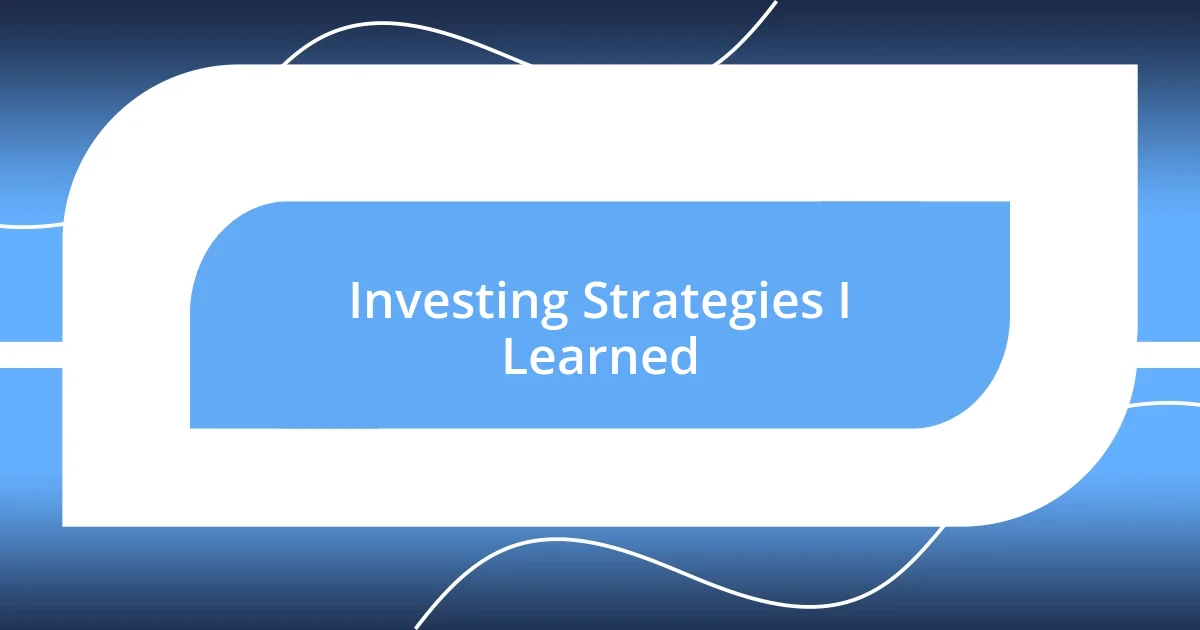
Investing Strategies I Learned
I discovered that diversification is a fundamental investing strategy that my financial advisor emphasized repeatedly. Early in our discussions, I remember expressing reluctance to spread my investments across various assets. I wondered, “Isn’t it less risky to focus on what I know best?” However, my advisor opened my eyes to how spreading investments can minimize potential losses, illustrating it with a relatable analogy. Just like a well-balanced meal keeps our bodies healthy, a diversified portfolio protects my financial health.
Another strategy I learned was the importance of long-term thinking in investing. I recall my initial discomfort with market fluctuations—every dip felt like a personal loss. My advisor reassured me, encouraging a mindset shift towards patience. “Investing is like planting a tree,” she said. “It takes time to grow and bear fruit.” Reflecting on her advice helped me grasp that, instead of constantly checking stock prices, I should focus on the bigger picture, which allowed me to breathe easier during turbulent times.
Lastly, I found that regularly reviewing my investment strategy is crucial. I was surprised to see how even small, consistent adjustments could significantly impact my portfolio over time. I remember our annual review meeting, where my advisor and I dissected the performance of different investments. It felt empowering to reassess what worked and what didn’t. This iterative process kept me engaged and motivated, as I felt like I was actively shaping my financial journey rather than just waiting for it to unfold. Have you ever felt overwhelmed by your investments? I certainly have, but this approach reassured me that I was in control.
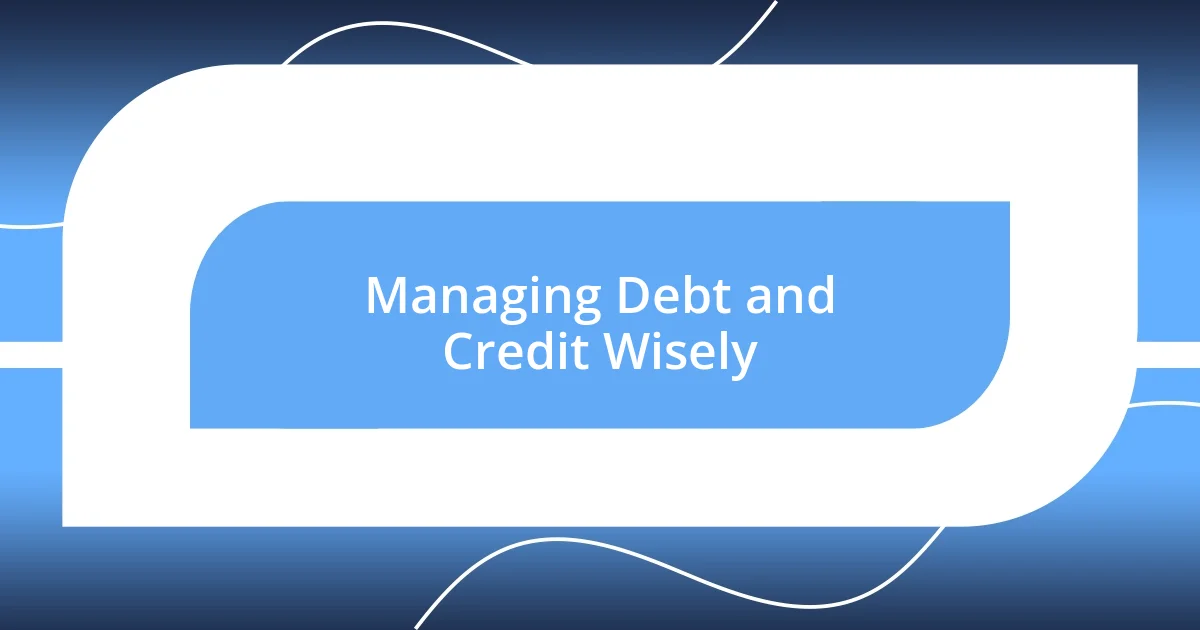
Managing Debt and Credit Wisely
Managing debt and credit wisely has been a significant learning curve for me. My financial advisor emphasized the importance of understanding credit scores and how even small changes can make a substantial difference. I remember the first time we checked my credit report together; I felt a jolt of anxiety as I saw its impact on loan rates and approvals. It really hit home when my advisor helped me set up a plan to manage my debts, tackle them one at a time, and improve my score. Have you ever felt like you were buried under debt? I certainly have, but breaking it down into manageable steps made all the difference.
Building a solid credit history is another lesson I learned, and it’s more straightforward than I initially thought. Tracking my credit usage was eye-opening; I realized that keeping my credit card balances low and making timely payments could elevate my score significantly. I still remember the joy I felt when my advisor alerted me that my score had jumped up ten points after just a few months of consistent effort. It was proof that small, consistent habits could yield impressive results. Who knew that a simple habit like paying bills on time could have such a ripple effect on my financial health?
I also discovered the importance of avoiding impulse purchases and separation of needs versus wants. Initially, I struggled with setting a budget, often buying unnecessary items that added to my credit card bills. However, my advisor encouraged me to adopt a more strategic approach. I began to allocate a specific amount for discretionary spending, which I found liberating! It transformed my shopping habits; I now pause and think, “Do I really need this, or is it just a fleeting desire?” This shift not only helps reduce debt but fosters a sense of control over my finances that I never imagined I could achieve.
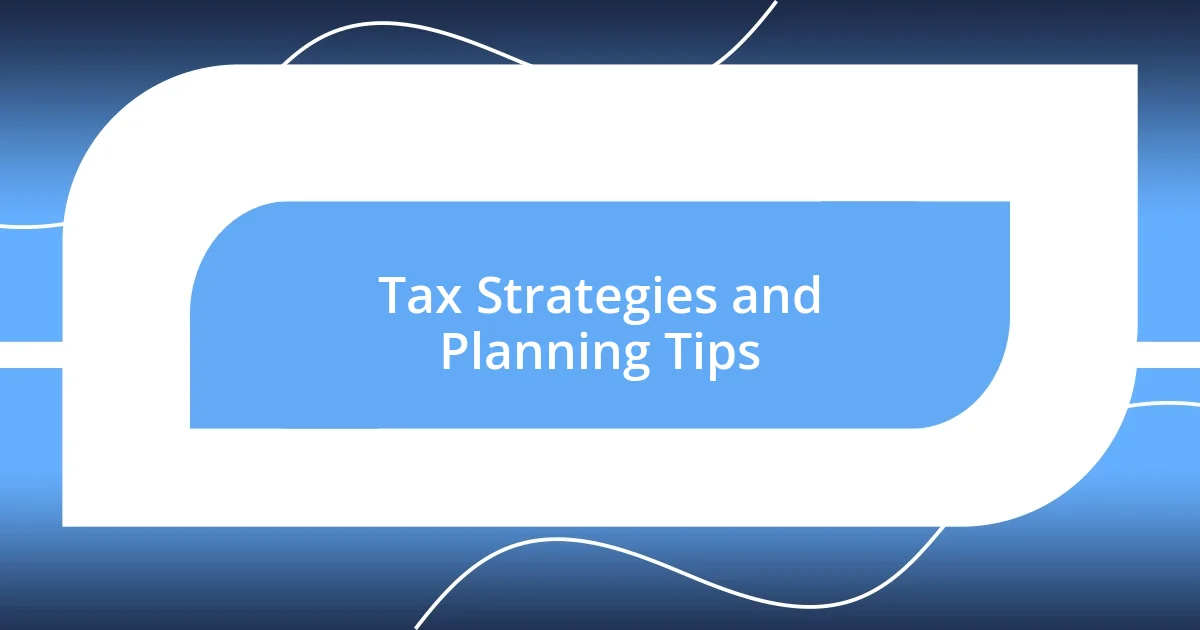
Tax Strategies and Planning Tips
Tax planning can feel overwhelming, but I learned some invaluable strategies that can simplify the process. For one, my advisor helped me understand the significance of tax-advantaged accounts, like IRAs and 401(k)s. The moment I realized that contributing to these accounts could lower my taxable income while growing my savings felt like finding a treasure chest I didn’t know existed. It made me rethink how I approached retirement savings, and I began maximizing my contributions to take full advantage of those tax breaks.
Another insightful lesson I absorbed was the importance of tracking deductions—something I had previously overlooked. I used to dread tax season, but now, I keep a running list of deductible expenses like medical bills and charitable contributions. It’s become a habit for me; I even created a simple spreadsheet! This practice not only eases the stress during tax time, but it also maximizes my potential returns. Have you ever combed through receipts only to realize you missed opportunities? I certainly did, but now I see how simple organization can translate into significant savings.
Lastly, I discovered the power of consulting a tax professional for complex situations. A few years ago, I faced a tax dilemma involving rental properties. Instead of struggling alone, I sought my advisor’s expertise. Their tailored guidance helped me navigate depreciation and avoid costly mistakes. It truly highlighted the value of seeking help when needed. I now see tax planning as a collaborative effort, where expert insights can lead to smarter financial decisions. Does the thought of taxes still send you into a panic? I used to feel that way too, but forming a partnership with a knowledgeable advisor made all the difference for me.

Building Long-Term Wealth Effectively
Building long-term wealth is a journey, and my financial advisor helped me map out the path. I learned that early and consistent investing can yield incredible results over time. I still remember the excitement when I set up my first investment account. Watching my money grow, even slowly in the beginning, was like nurturing a tiny seed into a lush plant. Have you ever planted something and eagerly awaited its blooms? That anticipation drives commitment in investing as well.
Another game-changer was the emphasis on diversification. Initially, I thought putting all my money in tech stocks was a smart play. My advisor opened my eyes to the risks of concentration. I vividly recall our discussion about the market downturn that impacted many of my favorite companies. It was a wake-up call! Now, I approach my portfolio with a balanced mindset, spreading my investments across various sectors. This strategy not only cushions me against losses but also allows me to participate in broader market growth. Can you see the value in having a well-rounded approach?
Lastly, I discovered the critical role of setting specific financial goals. My advisor encouraged me to visualize my future, from retirement dreams to buying a home. I remember jotting down my aspirations during a session and feeling a surge of motivation. It was eye-opening to realize that every dollar saved contributes to those dreams. Creating a clear roadmap infused my financial decisions with purpose. How about you? Have you thought about what your financial goals are? I found that clarity significantly enhances my commitment to building long-term wealth effectively.












